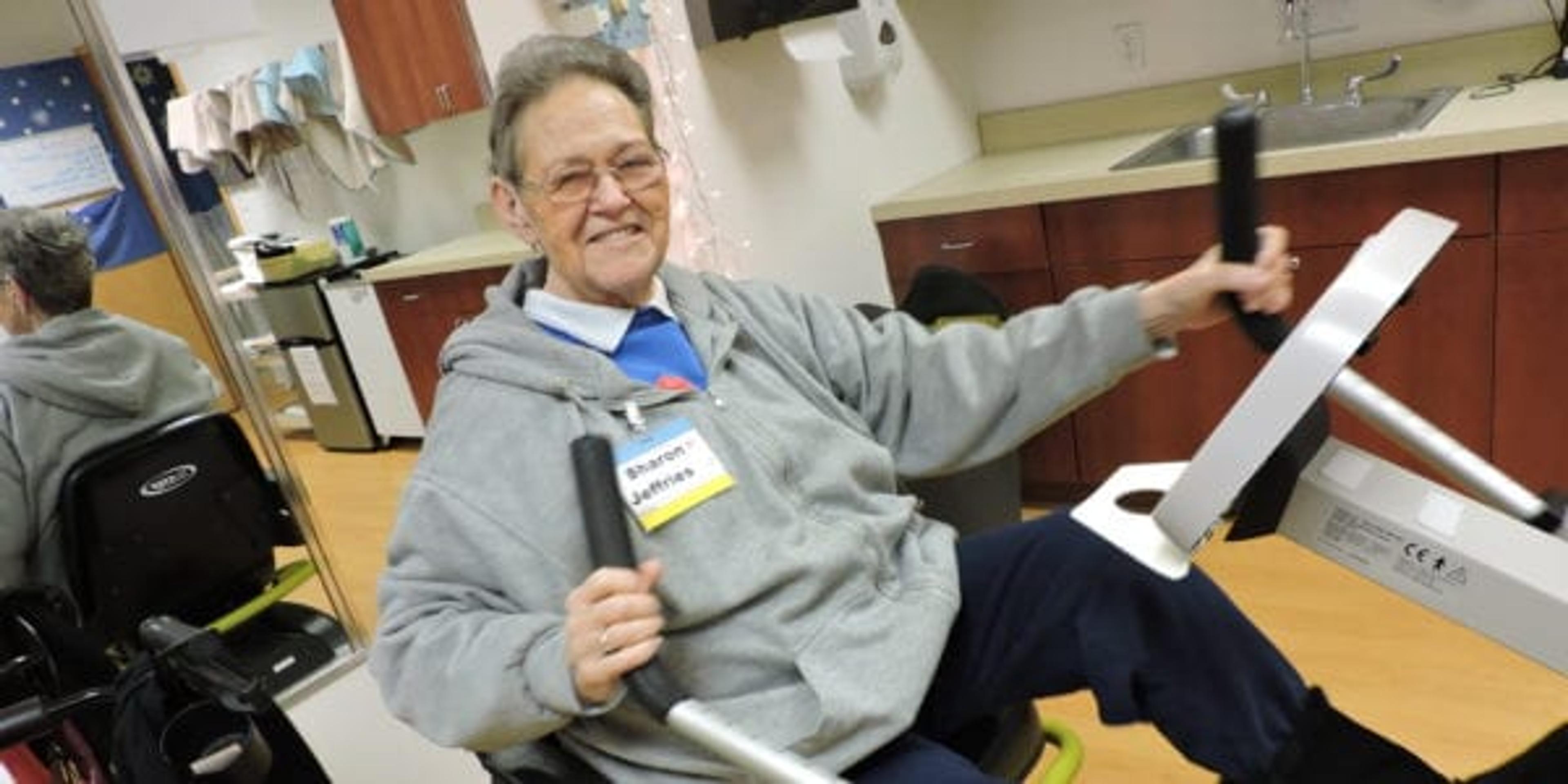Southwest Michigan Seniors Don’t Have to Face Aging Alone

Julie Bitely
| 6 min read

For the first time in her 70 years, Sharon Jeffries is living on her own.
Growing up in the 1950s, she lived in her parents’ home, then became a wife and mother. After her husband died, her adult children moved in with her.
One of the reasons she moved to her own apartment in Battle Creek at the end of 2015 was to utilize services offered through CentraCare, a program designed to support frail older adults as they age independently in the community. Services are offered in seniors’ homes and at day health centers in Battle Creek and Kalamazoo.
Socialization, nutrition, medical care, medication management, therapy and transportation are just some of the services offered through CentraCare, which is a Program of All-Inclusive Care for the Elderly, or PACE. Residents in Calhoun, Kalamazoo, and eastern Van Buren counties are eligible for PACE services through CentraCare.
Staff drive Jeffries to her dialysis sessions, the grocery store and other appointments. They help with meals and other chores as needed. Jeffries receives medical care at the center, as well as physical therapy. She’s made friends at the center and likes to work on needlepoint projects while she socializes with other program participants. The staff also rate high in her opinion.
“The people here are really nice,” she said. “They always have a smile and ask if they can do anything for you and it’s just amazing.”
She’s enjoying living on her own, but said it wouldn’t be possible without the support of CentraCare services.
“I just think it’s something that every county should have for the elderly,” she said.
Independent, but not alone
To qualify for CentraCare services, seniors have to require help that enables them to live independently.
“When they come to us, it’s because they want to live in their homes, but they’re sick enough to live in a nursing home,” said Greg Miller, CentraCare marketing manager.
While nursing home care is sometimes necessary, it’s not always the best fit, said Laura Ferrara, CentraCare director of operations and business development.
“There’s a great deal of autonomy and identity that is lost,” Ferrara said.
People often turn to assisted-living facilities due to safety concerns, but often lose the emotional and social safety net they might have had living in their own home and community, said Alexandria Lueth, CentraCare CEO and CFO.
The end of life means facing many losses, including a sense of independence, family members and friends. CentraCare officials say the services they provide can deliver the best of both worlds to seniors and their families struggling to find the right balance between independent living and support.
They all have favorite participant stories of the blossoming that can occur when seniors feel supported and connected. They’ve seen people discontinue use of anti-depressant medications after finding the social connection they were missing at the day centers. A gentleman who struggled with substance abuse, and consequently law enforcement, has been able to turn his life around since coming to the center. Ferrara said he feels supported for the first time in his life.
Lueth marvels at a woman who didn’t want to come to the day center at first, but reluctantly started making the trip once a week. The change in her attitude and emotional health has been remarkable, Lueth explained.
“I think she found a sense of belonging and socializing that she had been missing,” she said.
CentraCare staff work directly with the individual needing help and family members, if desired, to come up with a comprehensive plan tailored to a person’s unique needs.
“The family can be as involved as they’d like to be, provided the participant is okay with it,” Miller said.
Respite for caregivers
Marlene Lawson considers CentraCare staff part of her extended family.
Her mom, Ruth Maguire, utilized services for the last five years of her life, before she passed away at the age of 93 in 2015.
After Maguire acknowledged needing help with daily living needs, Lawson moved her into her home. The youngest of three siblings, she was the closest and most capable, plus she’d do whatever she could to help her mom.
Still, the transition wasn’t easy.
Maguire was losing the ability to do the things she liked, such as going for walks by herself due to increasing instability. Lawson suspects she was also dealing with anxiety and depression. Despite wanting to help her mom, Lawson was also feeling a loss of freedom as her caretaker and a sense of despair about their future together.
“You face your own mortality and aging when you come to this point in life,” Lawson explained.
She and her siblings discovered CentraCare through a family friend and that’s when everything changed, Lawson said.
“It got mom engaged in life a little bit more than just being home with the family,” she explained.
The burden of being her sole caregiver also fell off Lawson’s shoulders, freeing her from resentfulness toward her mom and siblings who weren’t able to help as much as she might’ve liked. She feels the help made it possible for her family to avoid negative feelings and focus on their mom’s quality of life.
“This was truly a lifesaver for our family,” Lawson said. “I truly cannot imagine how we would have navigated the last five years of mom’s life or if she would have even had the quality of life or lived that long.”
Lawson still visits the staff at CentraCare, many of whom came to her mother’s memorial service.
“It takes a special calling and gift to work with various populations, and seniors are no exception, and to be able to work with the families and the seniors to make this life transition easier and dignified, it’s priceless,” Lawson said.
When to ask for help
When do you know it’s time to seek assistance to live independently?
Miller said friends and family members of seniors should watch for a few telltale signs:
- Struggling with memory
- Difficulties with balancing a checkbook or managing a household
- Not responding to phone calls
These could be clues that it’s time for help.
“Any changes to the norm could really be a red flag,” he said.
If you’re a senior having trouble managing everyday tasks or have a friend or family member who needs assistance and you live in counties eligible for CentraCare services, find out more at their website. Find out if there’s a PACE program near you at the state of Michigan’s website.
If you enjoyed this post, you might also like:
Photo credit: Julie Bitely





